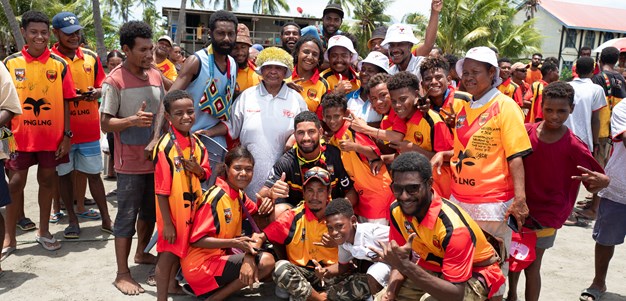Mark down April 9, 2014 as a watershed day in Australian sport, with the NRL leading the country's major professional sporting codes in a united front against homophobia on the playing field.
NRL CEO Dave Smith, South Sydney, Queensland and Kangaroos legend Greg Inglis and Jillaroos star Jess Palmer took charge for rugby league at a co-ordinated zero-tolerance campaign in Sydney aimed at silencing those who discriminate against an individual based on their sexual orientation.
But make no mistake: although the big guns - Smith, the AFL's Andrew Demetriou, the A-League's David Gallop, the Australian Rugby Union's Bill Pulver and Cricket Australia's Ben Amarfio - were speaking on behalf of their respective codes, their bullets will find their mark in broader society.
.@greg_inglis has supported the @NRL Diversity and Inclusion Policy, aiming to eliminate homophobia & discrimination: http://t.co/wZwqxfXCo3
— South Sydney (@SSFCRABBITOHS) April 9, 2014Cumulatively, the reach of rugby league and sport is enormous. Children and teenagers in their formative years hang off what the stars have to say. If the NRL continues to be steadfast with its mission, change through increased acceptance and fewer incidences of homophobia are inevitable.
Inglis is proud to be involved, not through any personal connection or observation or experience, but rather because as an aboriginal man he knows first-hand the hurt that discrimination can cause.
"In the environment we are in now, and the culture of the Australian sporting world, I honestly think it's each to their own," said Inglis.
"If individuals want to come out and promote that they're gay I'm all for it."
Smith is determined to make a difference; he acknowledges that on occasions in the past rugby league has handled its response to homophobia poorly. He did not mention it directly but there was no escaping his reference to Newcastle's Ryan Stig's condemnation of gay lifestyle last year.
"We should have been stronger about our condemnation of those remarks," Smith concedes. "We've learned from that experience and we'll take a harder line against anyone in our game making such appalling comments today."
In no way is the NRL's stand solely about paving the way for gay and lesbian players to feel comfortable about revealing their sexual orientation. That's a private matter for the individual to decide.
It's estimated more than two per cent of the Australian population is gay or lesbian. There are almost 500 players in the NRL in 2014... and more than 1000 more in the Holden Cup, NSW Cup and Intrust Super Cup.
Few are on the record as being homosexual.
So what? That's not the point. The point is that the NRL has made it clear it will do everything it can to present an educated, non-threatening environment whereby its players who are gay or lesbian will not be left feeling alienated from their peers, or discriminated against or vilified.
And the benefits will be felt way beyond professional sport.
Right now, no doubt, there are some kids - the stars of their teams - playing junior footy who are struggling with their identities.
Hopefully they will read about Dave Smith's, Greg Inglis's, Jess Palmer's and rugby league's collective stand, and the new Diversity and Inclusion Policy aimed at eliminating homophobia and other discrimination, and they will feel no small amount of weight lift from their shoulders.

